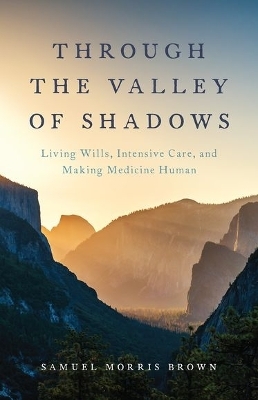
Through the Valley of Shadows
Oxford University Press Inc (Verlag)
978-0-19-939295-7 (ISBN)
Hospital intensive care units have changed when and how we die--and not always for the better.
The ICU is a new world, one in which once-fatal diseases can be cured and medical treatments greatly enhance our chances of full recovery. But, paradoxically, these places of physical healing can exact a terrible toll, and by focusing on technology rather than humanity, they too often rob the dying of their dignity. By some accounts, the expensive medical treatments provided in ICUs also threaten to bankrupt the nation.
In an attempt to give patients a voice in the ICU when they might not otherwise have one, the living will was introduced in 1969, in response to several notorious cases. These documents were meant to keep physicians from ignoring patients' and families' wishes in stressful situations. Unfortunately, despite their aspirations, living wills contain static statements about hypothetical preferences that rarely apply in practice. And they created a process that isn't faithful to who we are as human beings. Further confusing difficult and painful situations, living wills leave patients with the impression that actual communication with their physicians has taken place, when in fact their deepest desires and values remain unaddressed.
In this provocative and empathetic book, medical researcher and ICU physician Samuel Morris Brown uses stories from his clinical practice to outline a new way of thinking about life-threatening illness. Brown's approach acknowledges the conflicting emotions we have when talking about the possibility of death and proposes strategies by which patients, their families, and medical practitioners can better address human needs before, during, and after serious illness.
Arguing that any solution to the problems of the inhumanity of intensive care must take advantage of new research on the ways human beings process information and make choices, Brown imagines a truly humane ICU. His manifesto for reform advocates wholeness and healing for people facing life-threatening illness.
Samuel M. Brown is Assistant Professor of Pulmonary and Critical Care Medicine and Medical Ethics and Humanities, University of Utah School of Medicine and founder and director of the Center for Humanizing Critical Care at Intermountain Medical Center. A practicing intensive care physician, researcher and award-winning historian of ideas, Dr. Brown writes at the intersections of medicine, ethics, and culture.
Table of Contents ; Acknowledgments ; Introduction ; SECTION ONE: PAST ; Chapter 1. A Culture in Crisis ; Historical Death Culture and the Dying of Death ; Life Support and the Miracles of Resuscitation ; The Rise of Intensive Care and <"Life Support>" ; Life in the 1960s ; Chapter 2. The Rise of the Living Will ; The Findings of the Court ; Legislation ; Disclosurism and a Focus on Procedures ; Improving enforcement ; Futility, Financial Disaster, and Obligations to Society ; Expanding horizons ; Chapter 3: Empirical and Ethical Problems with Living Wills ; Conceptual Problems with Living Wills ; Pig Iron under Water: Living Wills Don't Apply in Real Life ; Paradoxical Threats to Autonomy ; <"If I'm ever like that, let me die>": Disability Stigma ; The Limits of Prediction Make Living Wills Difficult to Use ; Problems of race ; Living Wills Can Backfire ; Empirical evidence that Living Wills Don't Work ; SECTION TWO: PRESENT ; Chapter 4. Living Wills Don't Make Decisions; Human Beings Do ; Thinking like a Human Being ; What your Brain Doesn't Know Might Kill You ; Affective forecasting and psychological adaptation ; Things that Go Bump in the Night ; Moral Distress ; Moral Hazards ; Choosing to See ; Chapter 5. The Barbaric Life of the ICU ; Barbarism and Brutality ; The Experience of the Ventilator ; Immobilization ; Tubes and more tubes ; The Brain under Siege ; Terrible Communication ; We Don't Always Know What We Want ; Deforming Death in the Rush to Rescue ; Chapter 6. Life after the ICU ; A Few Visionary Researchers ; The Post-Intensive Care Syndrome ; Bodies ; Muscles ; Lungs ; Brains ; Psyches ; Is It All Worth It? ; The Tension between Outcomes Research and Advance Directives ; SECTION THREE: FUTURE ; Chapter 7. Reform: The Current State of the Art ; Eliciting Values and Wishes ; Registration Drives for Advance Directives in Wisconsin ; Multimedia Persuasion ; Tailoring Advance Care Planning ; Decision Aids ; Choice Architecture ; The Science of Communication ; The Conversation Project ; Redesigning the ICU ; Chapter 8. Healing the Intensive Care Unit ; Let Families In ; Fixing Code Status ; Hope for the Best, Prepare for the Worst ; Wrapping Up ; Recognize the Crossroads ; Create a Support Community ; Create Space for Facilitated Farewells ; Change the Framing to Manage Clinicians' Moral Distress ; Changing Culture outside Medicine ; Not Left Unsaid ; Authentic Personalization ; A Possible Map: Five Approaches to the ICU ; Approach 1: Do Everything ; Approach 2: Be Aggressive Only if I Have a Reasonable Chance of Recovery ; Approach 3: Only Admit Me to the ICU if I Have an Excellent Chance of Recovery ; Approach 4: Don't Admit Me to the ICU ; Approach 5: Don't Admit Me to a Hospital; Focus Only on My Comfort ; Epilogue. What Should We Do in the Meanwhile?
| Erscheinungsdatum | 23.04.2016 |
|---|---|
| Verlagsort | New York |
| Sprache | englisch |
| Maße | 157 x 231 mm |
| Gewicht | 544 g |
| Themenwelt | Medizin / Pharmazie ► Medizinische Fachgebiete ► Intensivmedizin |
| Medizin / Pharmazie ► Medizinische Fachgebiete ► Medizinethik | |
| Medizin / Pharmazie ► Medizinische Fachgebiete ► Palliativmedizin | |
| Studium ► Querschnittsbereiche ► Geschichte / Ethik der Medizin | |
| ISBN-10 | 0-19-939295-1 / 0199392951 |
| ISBN-13 | 978-0-19-939295-7 / 9780199392957 |
| Zustand | Neuware |
| Haben Sie eine Frage zum Produkt? |
aus dem Bereich


